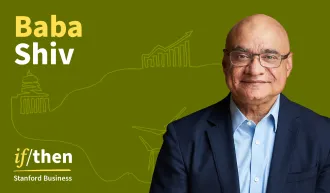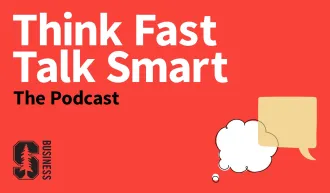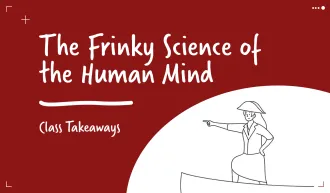A Prescription for an American Economic Recovery
Economist Edward Lazear says Congress and the president must focus on policies that encourage greater investment.
February 15, 2013

Edward Lazear, professor of economics
Unless the United States is willing to curb the growth in government-funded health care, it is looking forward to slow job growth and a 50% increase in federal taxes on every American, not just the rich, according to economist Edward Lazear.
Speaking to Stanford University employees a few hours before President Obama’s State of the Union speech on Feb. 12, the former chair of President Bush’s Council of Economic Advisors outlined why he believes the U.S. economy is “not on a recovery trajectory,” and suggested options available for getting on one. The best options, he said, are for Congress and the president to focus on tax, budget, international trade, and regulatory policies that encourage more investment in capital, human capital, and technology. Recent research he coauthored suggests job growth is slow not because of any structural mismatch between available jobs and worker skills, he said, but rather because of slower economic growth than normal for a recovery period following a recession.
The country’s gross domestic product is growing at around 2%, well below the 3% long-term trend. A return to the trend requires a growth rate of 5 or 6% in the short term to make up for the 2008-2010 recession, said the professor of human resources management and economics at Stanford GSB.
One question raised by his remarks was why, if more investment would add jobs and national income growth, were so many American corporations holding onto cash, rather than investing it?
Some economists have suggested it is because there is too much uncertainty about the economic future, Lazear said. His own explanation is the opposite: too much “certainty of bad stuff.”
“This is not exactly a positive business climate,” he said, citing recent increases in capital gains taxes and in regulations that cost businesses money such as the Dodd-Frank Act, the Environmental Protection Agency’s regulation of coal-fired power plants, and the National Labor Relations’ Board ruling not permitting Boeing to move a manufacturing plant from Washington state to South Carolina. Businesses also are concerned, he said, about the Obama administration’s projections of growth in the government’s deficit.
The deficit projections are driven by anticipated growth in Medicare and Medicaid spending, he said. If no way is found to curb the growth in those expenditures, taxes will need to be raised 50% on everyone. While all taxes are a drag on investment, he said, most economists agree the best way to raise them is through a consumption tax — a federal sales tax added on top of the sales taxes that many states and localities levy.
One puzzle of the current economy, Lazear said, is why the stock market is doing so well. “I’m glad, but it is hard to understand why.” In research he is conducting with two other labor economists, he said it appears that as workers were laid off, the productivity of those who remained increased. “That is pretty good for profits, but it’s not clear that is sustainable over the long haul,” he said.
In a research paper presented to Federal Reserve officials at Jackson Hole, Wyo., in August, Lazear and James Spletzer of the U.S. Census Bureau found that jobs in construction, manufacturing, and retail trade accounted for more than half of the unemployment during the recession but were also the industries making the biggest employment gains in the recovery. “If it were a structural problem, those construction guys who lost their job would be stuck permanently without a job,” he said. “There is still high unemployment in construction, but the reason is a very weak recovery.” As a result, one could not rule out that Fed monetary policy might be helpful.
Because of the weak recovery and population growth, he said, only 59% of the working age population is employed now, compared to 61% in the worst two months of the recession, January and February 2009.
After his talk, Lazear was asked to comment on political difficulties of taking policy action. He characterized the gridlock in Washington as based on a philosophical difference between the Republicans, convinced of the importance of economic incentives, and the Democrats, who were less concerned with adverse incentive effects of redistribution.
Lazear is the Jack Steele Parker Professor of Human Resources Management and Economics at Stanford GSB and the Morris Arnold Cox Senior Fellow at Hoover Institution.
For media inquiries, visit the Newsroom.
Explore More

Class Takeaways — How Managers Can Think Like Economists

“You Can’t Have Capitalism Without Capital’’



